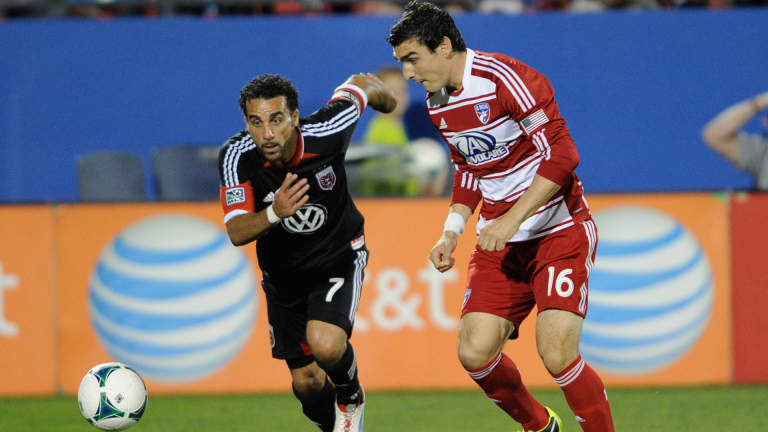The shot goes wide. Goal kick coming. Quick look over at the coach. What’s that face? Is that anguish or excitement?
Ball’s back in. “Andy, slide left. Left shoulder! He’s on your left shoulder! Well done.”
Throw-in now. Quick look to the side. I’m pretty sure that’s anguish.
Ball’s back in. “Yeah, give it here.” I put my hands in front of me to tell my teammate I want the ball to my feet. It comes. I switch the field. We attack to the byline and get a corner.
I can’t keep waiting. I gotta know.
“Coach, what’s the score?”
“Don’t worry about it.”

Bobby Warshaw (R) duels Dwayne De Rosario during his playing days | USA Today Sports Images
He’s right, of course: That other game doesn’t matter at all. Well, it matters, but there’s nothing I can do about it. I can only play in this game. And we have to win. If we win, the other score doesn’t matter.
In my fifth year as a pro, my Norwegian team was fighting for a playoff spot. We needed to win and to get some help. I thought about the other game every second of our 90 minutes.
Because if the other team were to win their game, our win wouldn’t do us any good, anyway. How was I supposed to ignore that?
Such is life on the last day of the season.
And such is the coming experience for the Montreal Impact, Columbus Crew SC, New York Red Bulls, Atlanta United and Real Salt Lake (to a much more amplified anxiety level) on MLS Decision Day presented by AT&T.
Crew SC currently lead the Impact by two points. If Columbus win, they slot into the Audi 2018 MLS Cup Playoffs. If they draw or lose, it gets messy.
Montreal have 14 wins this year; Columbus have 13. If Columbus tie and Montreal win, they will be tied on points; Montreal will go through because the Impact will have more wins on the season.
Atlanta lead the Red Bulls by one point in the Supporters’ Shield race. If the Five Stripes win, the trophy is theirs. If they don’t, they leave the Red Bulls an opening.
And RSL, well… they don’t have a game, so they have to sit and hope the LA Galaxy blow it against Houston.
Every player in those games will be playing two games in their mind at once.
My teammates and I didn’t know anything about the other game until halftime. Our team coordinator had been checking the scores and couldn’t help himself. “Draw! They’re tied! Win and we’re good!”
Our coach didn’t hide his annoyance. He didn’t want us thinking about the other game. “We can only control what’s here,” was the line he had repeated beyond count that week.
It's essentially impossible to ignore the situation. When your fate depends on someone else, you can’t help but think about them.
Every facial expression the coach makes – What’s he hiding? Every rumble from the crowd – Anxious groan or excited rumble? Every shout from the stands (“They’re winning, you’re screwed”) – Is it true?
You have to deal with your own game – each pass, each duel, each adjustment – yet you can’t help getting deflated or elated based on the signs around you. You feel the emotions of your game, plus the pull of the other one.
It was the most exhilarating, tortuous experience of my life. In the end, we got the results we needed.
One thing that helped: We gave up a goal early. It made the situation on our own field feel more urgent and real. It smacked us into the present, as much as anything could. We had to find a goal. Chasing the game ensured we didn’t get caught in an anxious malaise. We had to fight; we didn’t get stuck in “Wait-and-See” hope.
That’s the biggest part of any decision day: Pushing away the fear and the hope, and just fighting for what you can control. If you don’t handle your own business, nothing else matters.













